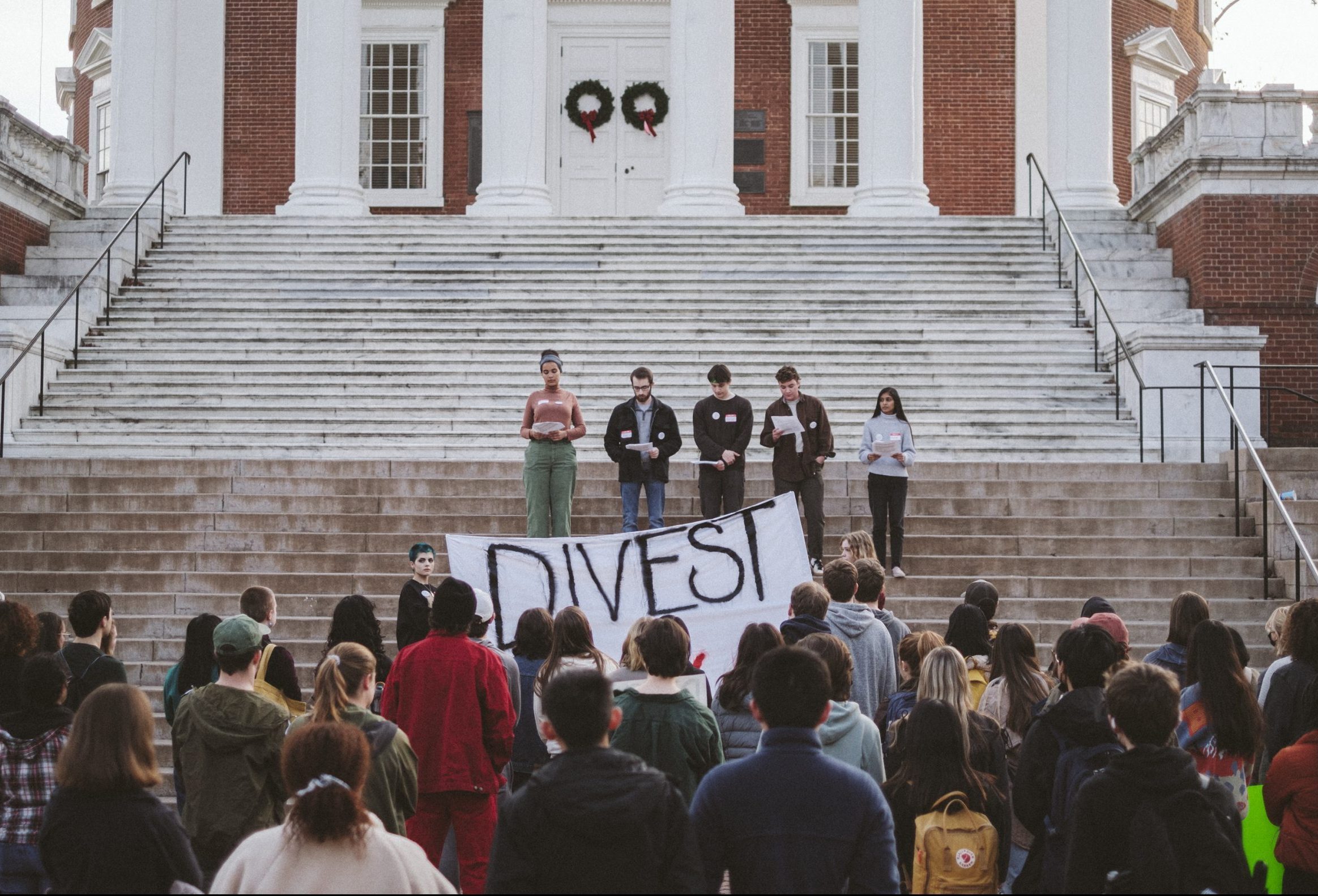By Kristin O’Donoghue
What do they want? Divestment. When do they want it? Now.
That was the message from UVA students and community members who gathered at the Rotunda December 4 for a rally protesting the university’s investment in the fossil fuel industry. Following remarks from student organizers, the group marched to Madison Hall to plaster a list of their demands on UVA President Jim Ryan’s door.
They want a public announcement of support for fossil fuel divestment from Ryan, the administration, and Board of Visitors, as well as an official commitment to divestment from University of Virginia Investment Management Company. It’s the latest wave of activism in a fight that’s been going on for years at the school.
“The goal of the rally was to push the Board of Visitors, administration, and UVIMCO to see that this movement has a lot of student support,” says Emilie Bidgoli, UVA Student Council’s sustainability deputy director. “It’s not fluff.”
Fossil fuel divestment means removing stocks, bonds, or investment funds that support fossil fuel companies from the university’s endowment. Activist groups and climate experts have encouraged universities to divest from fossil fuels, citing the need to adapt to a world altered by a changing climate and increased uncertainty about the viability of the fossil fuel industry. UVA keeps the exact composition of its investment portfolio under wraps, but the total endowment is worth $14.5 billion. According to UVA spokesperson Brian Coy, approximately 6 percent of UVIMCO’s “long term pool” is devoted to “natural resource investments,” a category that includes fossil fuels.
In 2020, the school announced a 10-year Sustainability Plan, which aims to “advance UVA as a global leader in creating equitable, replicable solutions to pressing, existential challenges.” The plan includes going carbon neutral and reducing the university’s nitrogen footprint by 30 percent before 2030.
For some students and community members, divestment is a key move for a school that has publicly committed to going green. A petition demanding divestment has 1,288 signatures.

“Our endowment investments should reflect our values, not the unjust power structures that we publicly decry,” the petition reads. It says UVA is directly contributing to carbon emissions through these investment practices.
The petition demands that UVIMCO release a transparent report regarding the extent of its current direct and indirect investments in the fossil fuel industry, fully divest from companies whose primary source of profit is fossil fuel extraction and refinement by the end of the year, and complete the total divestment from fossil fuels by the end of 2022.
UVA student Allegra Stewart has been working this year to relaunch Divest UVA, a student activist organization that was founded in 2015 but lost momentum, especially due to the pandemic, she says.
“UVA could be taking a leadership role, as one of the first schools in the South to divest. Still, they’re neglecting to take up the mantle.”
Around the country, calls for fossil fuel divestment have accelerated recently, and according to Fossil Free, over 100 colleges and universities have committed to partially or fully divest their fossil fuel investments from their endowments. In 2020, the University of California system got rid of all the fossil fuel investments in its $126 billion endowment. This September, Harvard followed suit. Across the state line at the University of North Carolina-Chapel Hill, students are lobbying for their school to make similar commitments.
Stewart says that when UVA’s divestment advocates first applied pressure last spring, administrators said their current focus was on racial equity, implicitly signifying that climate action would have to take a back seat. But Stewart sees the issues as intertwined. “Environmental justice is a racial issue—it touches everyone,” she says.
Stewart also notes that divestment is not just a UVA issue. “Every decision that UVA makes impacts the Charlottesville community,” she says.
Divest UVA has the support of the Student Council, which recently passed a resolution in support of the cause.
UVA is taking other steps toward environmental friendliness, both at its own volition and at the direction of the state. In July, Governor Ralph Northam issued an executive order banning single-use plastics at state agencies (and public colleges and universities). The UVA Office for Sustainability is working on a transition plan to phase out everything from plastic cutlery to trash can liners.
The university has publicly committed to become fossil fuel free in 2050, which Stewart called a “good first step.” Other UVA sustainability plan initiatives include reducing waste production by 70 percent, reducing water by 30 percent, and becoming carbon neutral by 2030.
“Meeting these bold sustainability goals will require passionate students, staff members, and faculty to take ownership of the way we use resources, the way we educate ourselves and others, and the way we engage with our fellow Hoos,” the UVA Sustainability page states.
UVA Batten school professor Daniel Reifsnyder, who worked on environmental issues in the U.S. State Department for more than a decade, says that divestment may be important to maintaining UVA’s standing as an environmentally responsible institution, which in turn, “may be important for attracting quality students.”
Reifsnyder, who co-chaired the U.N. negotiations that led to the Paris Climate Agreement, pointed to the results of Princeton Review’s College Hopes and Worries Survey, in which 78 percent of college applicants surveyed said that having information about a college’s commitment to the environment would affect their decision to apply to the school.
Coy says the school’s Advisory Committee on Investor Responsibility is “seeking to take a measured, thoughtful approach” to the issue, “that aligns with UVA’s mission and overall sustainability commitments and is consistent with UVIMCO’s fiduciary duty to the university.”
Coy says the investment team is putting together short, medium, and long-term recommendations, and it expects to respond to calls for divestment in greater detail in January 2022.
As one student organizer put it at the rally: “The success of UVA’s portfolio will be irrelevant in the event of a climate crisis.”






